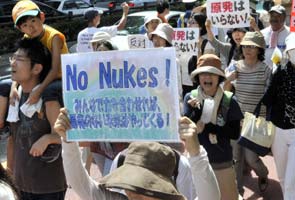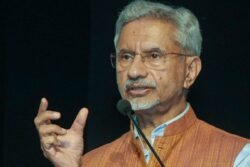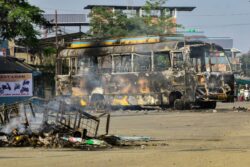Nuclear fears galvanise usually sedate Japan

Tokyo: Japan’s usually sedate society is angry and getting organised against nuclear power, with the kind of snowballing protest movement not seen for decades.
Weekly demonstrations outside the prime minister’s residence attract tens of thousands of people and a rally in west Tokyo this week drew a crowd organisers claimed at 170,000, demanding an end to atomic power in post-Fukushima Japan.
 And as numbers swell there are indications the country’s usually inflexible politicians are getting worried and just might start paying attention.
And as numbers swell there are indications the country’s usually inflexible politicians are getting worried and just might start paying attention.
“Before the disaster, I had never thought of taking part in rallies,” said 22-year-old Yusuke Hasunuma, referring to the tsunami-sparked meltdowns at the Fukushima Daiichi nuclear power plant in March 2011.
“But now I find it very exciting. It’s great to take action with other people who feel the same,” said Hasunuma, who has become a regular at the Friday evening protests in Tokyo’s political district.
“No one used to care before (the disaster),” said Masaki Yoshida, a mother-of-three who was forced from her Fukushima home by the radiation-spewing plant.
“But people now think keeping their mouth shut means saying ‘yes’ to nuclear power.”
Protesters’ demands are simple: Japan should abandon atomic power, a technology that industry, government and regulators had sworn was safe until a 9.0 magnitude earthquake sent a towering tsunami crashing into the Fukushima plant.
One by one the country’s nuclear reactors were shuttered for safety checks and by May 5 this year, a technology that had provided a third of Japan’s electricity needs was idle.
But amid warnings the country’s industrial heartland could run perilously short of power over the hot summer, Prime Minister Yoshihiko Noda in June ordered the restarting of two reactors.
That galvanised businessmen, housewives, parents with young children and a large number of elderly people, who came to the conclusion that taking to the streets was not so radical.
For Japan, analysts say, this marks a sea change in public attitudes where demonstrations are things that happen in other countries or belong to the past.
In the still-poor and war-battered 1950s a current of anti-US sentiment, particularly among radical students, sparked often violent rallies where clashes with police resulted in injuries and at least one death.
Then the protests were over an agreement that permits American military bases in pacifist Japan.
“The current anti-nuclear rallies are different from the ones against the US-Japan security treaty,” which had an ideological and political agenda, said Yoshikazu Sakamoto, honorary professor of politics at the University of Tokyo.
“Now, ordinary citizens are participating,” Sakamoto said. “Many of them just feel distrust of and frustration with the government.”
Kiyoshi Abe, professor of media and communication studies at Kwansei Gakuin University, said the large number of elderly people was a key characteristic of the recent movement.
“I think many of those who experienced World War II and particularly the misery of atomic bombs are participating,” Abe said.
“Elderly people worked hard and kept silent for the sake of the country’s recovery from the war, but they seem to have realised that what they dreamed of is different from what they are seeing now,” he said.
Abe said unlike sometimes bloody riots in other countries, the large presence of elderly appeared to have a calming effect on rallies in Japan.
And they are very ordered: protesters stick to the anti-nuclear message and go home in an orderly fashion at the appointed time.
But the demonstrations’ regularity and sheer size — even taking the police estimate of 75,000 people for Monday’s protest — is giving the government pause for thought in a country where for decades the political elite has largely ignored popular opinion.
As crowds gathered on Monday, Noda told a television programme he would “listen attentively” to voices raised in the debate.
“Nuclear energy is becoming an issue that divides the nation,” he said in an unusually candid assessment.
However, the University of Tokyo’s Sakamoto said the political classes may be able to out-wait the protests.
“People may abandon the current movement if nothing changes following recent efforts, and the country could return to its usual apathy,” Sakamoto said.
“Citizens’ movements in Japan are still in a transitional phase.”





